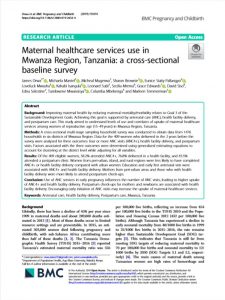
Background
Improving maternal health by reducing maternal mortality/morbidity relates to Goal 3 of the Sustainable Development Goals. Achieving this goal is supported by antenatal care (ANC), health facility delivery, and postpartum care. This study aimed to understand levels of use and correlates of uptake of maternal healthcare services among women of reproductive age (15–49years) in Mwanza Region, Tanzania.
Methods
A cross-sectional multi-stage sampling household survey was conducted to obtain data from 1476 households in six districts of Mwanza Region. Data for the 409 women who delivered in the 2years before the survey were analyzed for three outcomes: four or more ANC visits (ANC4+), health facility delivery, and postpartum visits. Factors associated with the three outcomes were determined using generalized estimating equations to account for clustering at the district level while adjusting for all variables.
Results
Of the 409 eligible women, 58.2% attended ANC4+, 76.8% delivered in a health facility, and 43.5% attended a postpartum clinic. Women from peri-urban, island, and rural regions were less likely to have completed ANC4+ or health facility delivery compared with urban women. Education and early first antenatal visit were associated with ANC4+ and health facility delivery. Mothers from peri-urban areas and those who with health facility delivery were more likely to attend postpartum check-ups.
Conclusion
Use of ANC services in early pregnancy influences the number of ANC visits, leading to higher uptake of ANC4+ and health facility delivery. Postpartum check-ups for mothers and newborns are associated with health facility delivery. Encouraging early initiation of ANC visits may increase the uptake of maternal healthcare services.